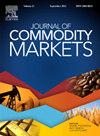Do different speculation strategies cause distinct impacts on the volatility of the live cattle futures in Brazil?
IF 4.5
4区 经济学
Q1 BUSINESS, FINANCE
引用次数: 0
Abstract
This study explores the relationship between speculators and the volatility of live cattle futures in Brazil, focusing on two distinct categories of speculation: day traders (and scalpers) and institutional investors. Analyzing the nearest and October contracts from 2006 to 2019, the research employs the ARIMA-GARCH methodology to estimate volatilities. Additional analyses are conducted to estimate the expected and unexpected effects of speculators on the previously determined volatility levels. Our findings indicate that day trader speculators heighten the volatility of contracts nearing expiration, primarily due to their unexpected actions and limited market information usage. They tend to buy high and sell low. In contrast, institutional investors, with access to more comprehensive information, have a moderate influence on volatility, capable of strategically maneuvering market distortions. The accuracy of the conclusions is strengthened by robustness and placebo tests.
不同的投机策略会对巴西活牛期货的波动产生不同的影响吗?
本研究探讨了投机者与巴西活牛期货波动之间的关系,重点关注两种不同类型的投机:日内交易者(和黄牛)和机构投资者。该研究分析了2006年至2019年最近和10月的合约,采用ARIMA-GARCH方法来估计波动性。进行额外的分析来估计投机者对先前确定的波动水平的预期和意外影响。我们的研究结果表明,日内交易者投机者加剧了临近到期合约的波动性,这主要是由于他们的意外行为和有限的市场信息使用。他们倾向于高买低卖。相比之下,机构投资者可以获得更全面的信息,对波动性的影响不大,能够从战略上操纵市场扭曲。结论的准确性通过稳健性和安慰剂检验得到加强。
本文章由计算机程序翻译,如有差异,请以英文原文为准。
求助全文
约1分钟内获得全文
求助全文
来源期刊

Journal of Commodity Markets
Multiple-
CiteScore
5.70
自引率
2.40%
发文量
53
期刊介绍:
The purpose of the journal is also to stimulate international dialog among academics, industry participants, traders, investors, and policymakers with mutual interests in commodity markets. The mandate for the journal is to present ongoing work within commodity economics and finance. Topics can be related to financialization of commodity markets; pricing, hedging, and risk analysis of commodity derivatives; risk premia in commodity markets; real option analysis for commodity project investment and production; portfolio allocation including commodities; forecasting in commodity markets; corporate finance for commodity-exposed corporations; econometric/statistical analysis of commodity markets; organization of commodity markets; regulation of commodity markets; local and global commodity trading; and commodity supply chains. Commodity markets in this context are energy markets (including renewables), metal markets, mineral markets, agricultural markets, livestock and fish markets, markets for weather derivatives, emission markets, shipping markets, water, and related markets. This interdisciplinary and trans-disciplinary journal will cover all commodity markets and is thus relevant for a broad audience. Commodity markets are not only of academic interest but also highly relevant for many practitioners, including asset managers, industrial managers, investment bankers, risk managers, and also policymakers in governments, central banks, and supranational institutions.
 求助内容:
求助内容: 应助结果提醒方式:
应助结果提醒方式:


